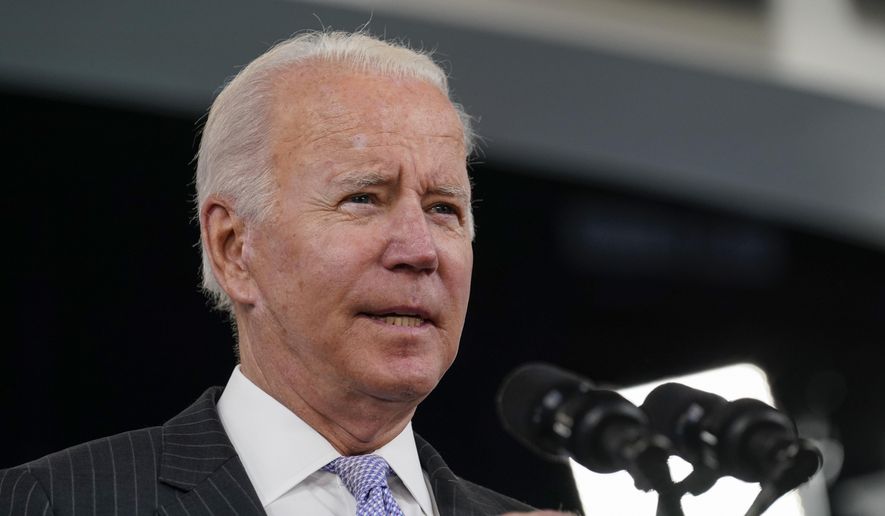Two leading fiscal watchdogs are raising alarms about the true cost of President Biden’s social welfare and climate change bill, arguing the total price tag is far higher than the $1.75 trillion that Democrats have estimated.
A new budget model released by the University of Pennsylvania’s Wharton School of Business on Thursday projected the real cost of the spending package could be more than $4.26 trillion. Economists reached the figure by extending all of the programs proposed within the bill over the next 10 years.
“By 2050, the proposal would increase [the] federal debt by 2.0 percent and decrease GDP by 0.1 percent, relative to the current law,” the economists wrote.
The president has claimed that the bill will cost “zero” and be paid for through tax increases on the wealthy and corporations.
Congressional Democrats have sought to downplay the cost of the package by limiting the life span of some of the more expensive programs.
The White House, for instance, has proposed to extend an expansion of the Child Tax Credit, which gives $300 a month to families with children under the age of six, for only a year. It has similarly proposed a one-year extension of the Earned Income Tax Credit.
For larger spending programs, like universal pre-kindergarten and child-care subsidies, Mr. Biden has proposed a six-year life span.
“We’re using 10 years of revenue to basically supply one, or two … or six years of services and that’s not the true cost,” said Sen. Joe Manchin III, West Virginia Democrat, during an appearance on MSNBC. “The true cost would be 10 years to 10 years.”
Mr. Biden and far-left Democrats believe the shorter funding measures are a risk worth taking. Both advocates and detractors say that once new entitlement programs are in place, they will prove difficult, if not impossible, to jettison.
Such tactics also prevent taxpayers from understanding the true overall cost of the package, according to fiscal watchdogs.
“Unfortunately, the framework relies heavily on the massive gimmick of arbitrary sunsets to make the numbers work,” said Maya MacGuineas, president of the Committee for a Responsible Federal Budget. “Extending these policies could end up costing up to $2 trillion over the decade, or perhaps even more.”
The CRFB, a nonpartisan economic think tank, also has a study out showing the real cost of Mr. Biden’s bill is above $4 trillion, after discounting budget gimmicks.
“As lawmakers work to turn this framework into legislation, they should swap out temporary proposals for permanent ones,” said Mrs. MacGuineas. “They should scale back, target, and prioritize to ensure the plan remains fully paid for.”
Both the Penn Wharton Budget Model and CRFB report pose a significant challenge to Mr. Biden and Democrats as they rush toward a vote on the spending package.
House Speaker Nancy Pelosi is aiming to pass the budget bill, alongside the administration’s $1.2 trillion infrastructure deal, before the end of the week.
“We’re going to pass both bills, but in order to do so, we have to have votes for both bills,” said Mrs. Pelosi, a California Democrat. “And that’s really where we are right now.”
Mrs. Pelosi’s timeline is unlikely to be met. Moderate Democrats are refusing to sign on the budget bill without knowing its full cost can be ascertained by the Congressional Budget Office.
“We’ve asked for certain CBO tables, we’re waiting on that and waiting for information we’re owed,” said Rep. Josh Gottheimer, a New Jersey Democrat. “Those are the kind of things that we think are really important to make sure we go through.”
The CBO, a nonpartisan federal agency responsible for analyzing the fiscal impact of legislation, is expected to take at least two weeks to properly vet the bill before releasing its findings.
Complicating matters is that the CBO cannot begin vetting the bill until it’s finalized. The latest version of the bill, which spans 2,135 pages, was only released to the public late Wednesday and remains a work in progress.
“We don’t have a final bill yet,” said Mr. Gottheimer. “There [are] still pieces being worked through in different areas … we’re reading through the 2,000 pages we got last night [but] there’s still changes being made.”
Despite the protests and the legislation not being final, Mrs. Pelosi is pushing forward. The speaker’s allies say the time has come to get some sort of bill out of the House. Once in the Senate, they say, momentum will increase to get the bill across the finish line.
Republicans say that policymaking on the fly, coupled with budget gimmicks, is a disaster for American taxpayers.
“I want the public to understand that the bill being sold to you as $1.75 trillion, when in reality if all the programs were permanent like the Democrats want them to be … it’s more than $4 trillion,” said Sen. Lindsey Graham of South Carolina, the top Republican on the Senate Budget Committee. “That means more debt for you and your children. And that means more inflation.”
• Haris Alic can be reached at halic@washingtontimes.com.




Please read our comment policy before commenting.